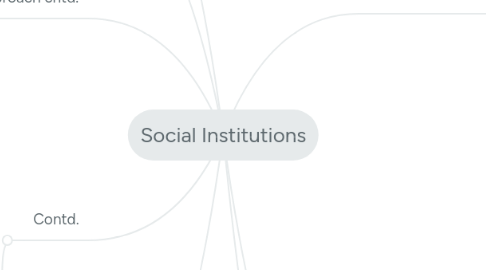Social Institutions
by Emma Dillon

1. What are Institutions?
1.1. Institutions are stable patterns of group behaviour which persist over long periods of time
1.2. In sociology the term ‘institution’ is often used to describe organising systems which allow humans to make sense of life and which assist human societies to function.
1.3. Institutions operate in 5 basic areas of life which are often referred to as the primary institutions
1.3.1. 1) Determining Kinship who should live with who and why? How should children be raised? What should the different roles in the family be? Relevant Institutions: family; church; education; media
1.3.2. 2) Providing for the legitimate use of power Who is allowed to imprison/punish us and on what grounds? Relevant Institutions: the state; education; media
1.3.3. 3) Regulating the distribution of goods and services Who gets what and why? How high should tax be and how much of this should be channeled back into welfare services How generous should welfare payments be Should there be wealth taxes? Relevant Institutions: the state; education; the media
1.3.4. 4) Transmitting knowledge from one generation to the next What should we teach our children? What should we not teach our children? What traditions should be kept and which ones should be abolished? Relevant Institutions: education; media; family; state; church
1.3.5. 5) Regulating our relation to the supernatural. Does God exist? Should our social practices and law reflect supernatural beliefs? Should one faith take precedence over others? Relevant Institutions: church; media; education; family
2. Sociological Approach
2.1. TV series ‘Love Hate’ vs Raw How the dynamics of power and inequality influence the spheres of: - Addiction - Crime/policing - The state - Housing policy - Education - The media
3. Institutions of Irish Society
3.1. - The family - The economy + work - Education - Religion - The media - The environment - The State
4. Sociology
4.1. The scientific study of society that aims to look at the causes and consequences of social change and the principles of social order and stability (Donohue and Gaynor, 1999
5. The Sociological Approach
5.1. Sociology forces us to question the status quo…which may lead to social change It allows us to consider the structural reasons for disadvantage. It allows us to consider why certain ideas are considered ‘mainstream’ while others are considered to be deviant or subversive.
6. Socioloogical Approach cntd.
6.1. Forces us to question the power relation between service user and service provider Does the service provider know best? Critical/reflexive perspectives coming from the sociological approach have resulted in certain changes
7. Contd.
7.1. It allows us to understand the self-image that Ireland has of itself (white, largely middle class, male dominated?) and how deviations from this self-image are dealt with. Useful to those working in early childhood as it allows a greater understanding of the powerlessness of those accessing services including early childhood services It highlights the relatively powerful position of other groups when they negotiate with marginalised groups The sociological approach also assists an understanding of how Negative stereotyping of certain groups (e.g. disabled) may result in weak policy attempts towards empowerment (e.g. employment) Media particularly powerful in this respect Formerly in ed. System – certain kids being primed for success
8. Initiatives
8.1. Involvement in policy making (National Children’s Strategy 2000 – children involved in consultation process) Client involvement on management boards (Simon Community) Working in partnership (Pavee Point) Urban regeneration schemes (Ballymun) The sociological approach also helps us to understand why such initiatives do little to tackle structural inequality

